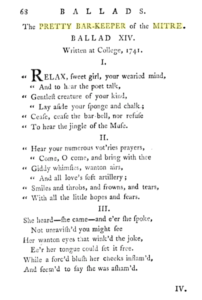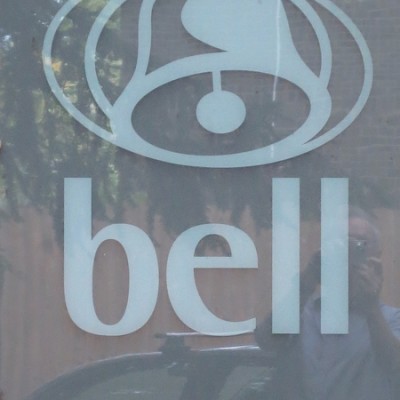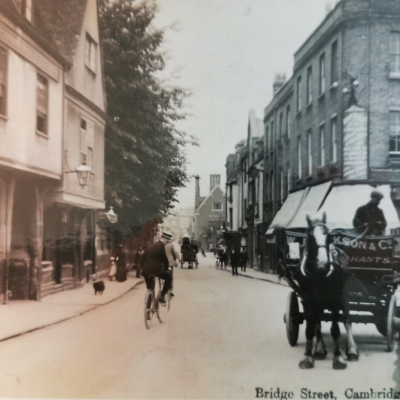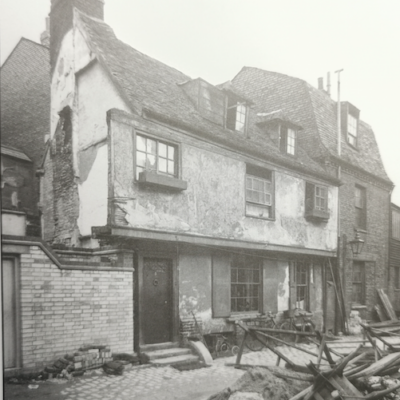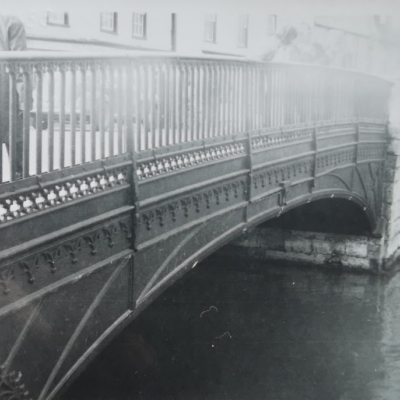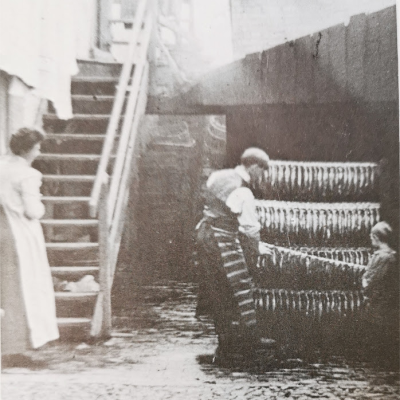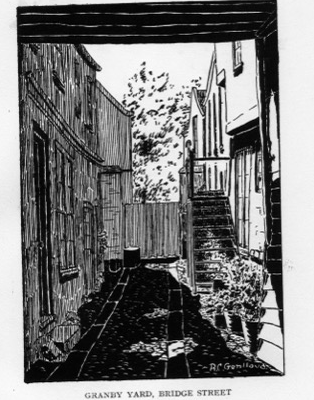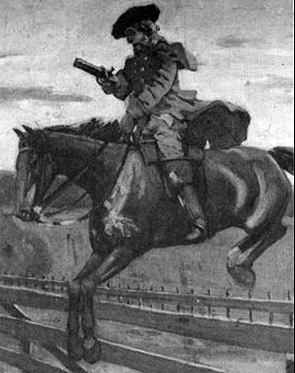Search by topic
- archaeology
- Building of Local Interest
- chapel
- charity
- church
- crime
- dressmaker
- fire
- Great Eastern Railway
- Listed building
- Mapping Relief
- medieval
- oral history
- poverty
- Public House
- Religious House
- Roman
- scholar
- school
- Then and Now
- tudor
- women
- work
- world war one
- world war two
Search by text
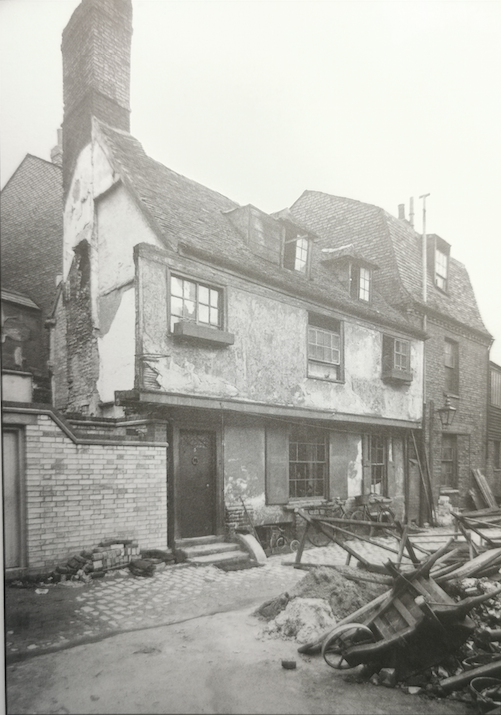 Blackamoor Head Yard, 1932 (photo W M Palmer). Alderman Nutting's house.(Cambridgeshire Collection)
Blackamoor Head Yard, 1932 (photo W M Palmer). Alderman Nutting's house.(Cambridgeshire Collection)17 – 18 Bridge Street, The Mitre / Blackmoor Head / Cock and Magpie
History of 17 Bridge Street
For the early history of the Blackmoor Head, look at entry on Clement Hostel. Further details in T E Faber, An Intimate History of St Clement’s Parish, 2006.
1615/16 Hugh Humphrey, baker, grated lease of Clement Hostel and in the same year granted an alehouse license
1614-26 Hugh, later John, Jones
1660-62 John Wood
1664-67 Henry Gunnell
On 27th Sep. 1665 John, son of Henry Gunnell, died of the plague. The inn was owned by Peter Lightfoot, fishmonger and alderman. Henry had to close the inn for 40 days. When Henry and his wife came out of quarantine they gave up the inn and moved across the lane to St John’s Lane, where henry died in 1667. (See Evelyn Lord, The Great Plague, p.63)
1671-93 Oliver Pangbourne, for Blackamoor’s Head 1672-74
1744-57 Robert, later Alice, Clarke, for Blackamore’s Head in 1752
1758-59 George Mead for Blackamore’s Head in 1752
1760-61 not listed
1762-91 Juner Perry, for Blackamoor’s head
1792 Sarah Perry
1793-1809 Joseph Lawrence
1809-15 Joseph Lawrence for Cock and Magpie
1810 John Day, brewer, for Blackmoor Head
1811-52 listed continuously as Blackmoor Head
1816-31 Sarah Lawrence for new Cock and Magpie until 1824 and for Cock and Magpie thereafter. ‘Liquor shop’ from 1829.
In 1825, when the property came up for sale, together with other lots that formed the Clement Hostel, the building was shared between the Blackmoor Head and a liquor shop, the Cock and Magpie.
The whole lot was bought by a Mrs Lawrence in the 1825 sale. and rebuilt by her.
1830 (Black-a-Moor’s Head) Francis Bell (Pigot’s )
1832-34 Juner Perry Lawrence and Edward Rist Lawrence for Cock and Magpie
1836-45 Ann Lawrence and Edward Rist Lawrence for Cock and Magpie
1839 (Blackamoor’s Head) Samuel Peacock (Robson’s)
The modern brick facade seems to have been built in or before 1841.
The last full reference found by T E Faber (An Intimate History of St Clement) to the Blackmoor Head was in the 1841 census. In the 1851 census it is only in the preamble to the return.
1851 (Blackmoor’s Head) Simon Barker (Gardner’s )
1852 (Blackmoors Head) James Ingram (Slater’s)
1853-56 not listed
1861
(17) William John Gallyon, 31, gunmaker, b Cambridge
(18) Edward R Lawrence, 54, wine and spirit merchant, b Cambridge
1871 18 Bridge Street, Cock and Magpie
Edward R Lawrence, wine merchant, widower, 64, b Cambridge
Emily Starmer, daughter, 35, b Cambridge
Kate Lawrence, daughter, 22, b Grantchester
Frances Thompson, servan, 19, b Coton
1874 (Cock & Magpie ) William Headdy
1876 Mitre not yet in existence. The site still belonged to one of Anne Lawrence’s sons, Edward Rist Lawrence at his death in 1876. In that year the Cock and and Magpie was at no.18 and shared its building with a shop at no.17.
1879 Thomas William Reilly (Kellys)
1881 (Mitre)
Elizabeth Mays, licensed victuallers wife, 33
John F Mays, 4 months, b Cambridge/
Julia Mays, mother, annuitant, widow, 55, b Guernsey
1883 Arthur Montague Butler (Kellys)
1888 Mrs Elizabeth Cue (Kellys)
1891
John Rich, 54, publican, b Girton
Ann, 55, b Cambridge
Elizabeth, 25, b Chesterton
Arthur J, 23, solicitor’s clerk, b Chesterton
Mary Draper, 19, general assistant, b Wales
In 1881 the Rich family were at the Horse and Groom, King Street
1892 John Rich (Kellys)
1896 Mrs Ann Rich (Kellys)
1901
John Rich, 64, licensed victualler, b Girton
Ann, 64, b Cambridge
Elizabeth, 38, b Chesterton
Arthur John, 34, clerk in college office, b Chesterton
Helen Osborn, 19, servant, b London
1904 Thomas McLachlan (Kellys)
1913 E Green (Spalding)
1913
The Mitre Hotel
J F Harlow, manager
(17a): Edgar H Mathie
1916 Frank E Rice ( Kellys )
1933 Thos. Stafford Spurgeon (Kelly’s)
1933
The Blackamoor Head Yard was swept by fire in 1933. CIP 6.10.1933: Near midnight one of the fiercest fires in Cambridge for years partially destroyed the Baron of Beef. The pub had only just been rebuilt with the demolition of seven old cottages.
1942
On the night of 27th July 1942 after the raid that caused widespread damage in the area, an unexploded bomb was discovered in the basement party wall. Another rested unexploded in the outbuildings of ‘The Mitre.’ When later analysed it was discovered that these were Sprengband C.50s, the first ‘Firepots’. (See Michael Bowyer Air Raid! pub. 1986)
1962
Mitre P H
(17a) William James Stubbings
Christopher Smart in 1741 wrote a poem entitled The Pretty Bar-Keeper of the Mitre. However the Mitre did not exist at this location until the latter half of the 19th century. The whereabouts of Smart’s Mitre is unknown.
Contribute
Do you have any information about the people or places in this article? If so, then please let us know using the Contact page or by emailing capturingcambridge@
License
This work is licensed under CC BY-NC-SA 4.0





